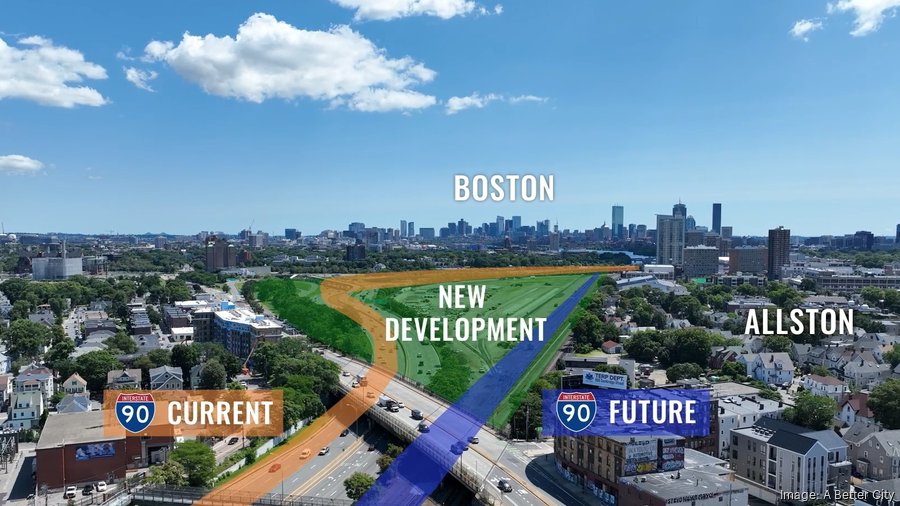Listen to this article 3 min
Massachusetts and the city of Boston have won $335.4 million in federal funding to straighten I-90 in Allston, a project that would create a West Station for public transit and unlock dozens of acres of riverside property for Harvard University to develop.
The grant covers only part of the estimated $1.9 billion cost, but backers of the infrastructure overhaul say it will go a long way towards making the project a reality after a decade of planning and debate.
U.S. Sen. Ed Markey, D-Mass., revealed the grant in a tweet Monday. A Markey spokesperson confirmed the funds are through the Reconnecting Communities and Neighborhoods program.
Officials had sought up to $500 million from that initiative, created under the 2021 federal infrastructure law and the Inflation Reduction Act to fund projects that reconnect parts of a city or neighborhood that were isolated by the construction of a highway or other transportation infrastructure.
The plan is to replace the aging viaduct between Cambridge Street and the BU Bridge and, in so doing, create a straighter Pike at ground level and shrink down the now-sprawling ramps on that part of the highway.
Those changes, in turn, could lead to new development that decades from now would create billions of dollars a year of economic activity in Allston and thousands of jobs, according to an analysis from nonprofit A Better City, a proponent of the project.
Right now, the Harvard-owned Beacon Park Yard, a 100-acre former rail yard on the Charles River, is cut off from the rest of Allston by the Pike. The project would stitch the land back together with the rest of the neighborhood. Harvard is already developing nearby property in Allston with life sciences labs, housing, academic buildings and more.
The transformation of the area would include a new West Station with commuter rail service to and from Worcester and bus service. Other benefits touted by supporters include increased public space on the Charles, better transit for bikers and more open space more broadly.
But even as boosters cheer the grant, the project has a long way to go.
The city of Boston has committed $100 million in budgetary dollars towards the project. Harvard has pledged $90 million, and the city and Harvard expect to raise another $100 million through a special initiative that accounts for future property taxes at the site and development fees. Boston University has also committed a reported $10 million.
The state would likely be on the hook for much of the remaining costs. The news outlet Commonwealth Beacon reported in August that money would come from $470 million in bonds and loans, $200 million in highway tolls and $450 million from the “millionaire’s tax." However, a Massachusetts Department of Transportation spokesperson declined to confirm those amounts to the Business Journal last week, saying only that state contributions “will combine bond fund allocations with other project financing vehicles.” A press release from the Healey administration Monday night did not specify state funding.
The project also needs to go through a major environmental review that is expected to kick off later this year. The Charles River Watershed Association has expressed concerns about the initiative’s effects on the river.
A coalition of Boston-area business groups has thrown its support behind the project, including the Boston, Cambridge and Worcester chambers of commerce, the Massachusetts Competitive Partnership and MassBio.
“This funding is a massive win for Massachusetts that will deliver transformational transportation options, unprecedented development opportunities, and critical environmental benefits for Boston, Worcester, and beyond,” A Better City CEO Kate Dineen said in a statement.
The state had previously been unsuccessful in its attempts to get funding for the I-90 project from the Biden administration.
“The Allston Multimodal Project is a once-in-a-generation opportunity to improve transportation infrastructure in the Allston community and better connect residents across the state with housing and job opportunities," Gov. Maura Healey said in a statement.
Boston Mayor Michelle Wu also lauded the award, saying in her own statement that her administration “will continue to work with the Allston community to refine a design that improves... our city for generations to come."
Sign up for the BBJ's newsletters and never miss a development story.
Total MBA enrollment
| Rank | Prior Rank | School/Prior rank (*unranked in 2023)/ |
|---|---|---|
1 | 1 | Boston University (Questrom School of Business) |
2 | 2 | Harvard Business School |
3 | 3 | University of Massachusetts Amherst (Isenberg School of Management) |



